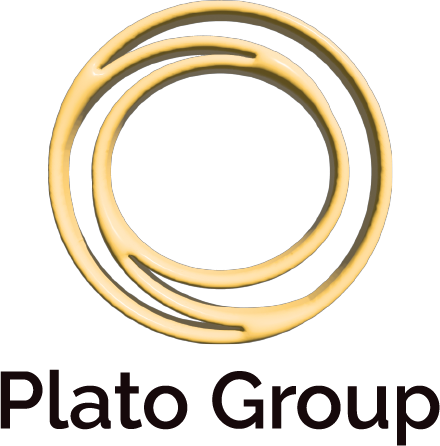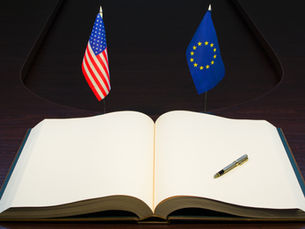The Future of Transatlantic Relations
- Daniel Mulhall

- May 8, 2025
- 10 min read
Whither Transatlantic Relations?
The NATO Alliance, which has helped keep the peace in Europe for 75 years, is now on shaky ground in light of tensions between the US and Europe around trade and the war in Ukraine. With Washington seeming to cosy up to Moscow, many European governments now feel they can no longer rely on US security guarantees. Donald Trump’s harsh rhetoric about transatlantic trade imbalances, and his taunting of Canada and Greenland, have added to European alarm about the future of its most critical external relationship, which has long been a cornerstone of prosperity and security.
Those developments, which are a product of US unhappiness about what many there see as a lop-sided relationship, have drawn urgent attention to the strengthening of Europe’s defence preparedness through increased spending and intensified collaboration. There is uncertainty about the capacity of Europeans to face up to Russia without an American backstop, but the emergence of a more free-standing European defence body involving EU countries and the UK now seems entirely possible. It could bring the UK back into the European fold without undoing Brexit.
Does the second Trump Administration represent a watershed moment in transatlantic relations, or do we need an alternative metaphor to describe its impact? What is the likely future direction for ties between the United States and European countries? Can their long and productive partnership be adapted to the evolving conditions of the 21st century? In my experience, the EU is at its best when it is severely tested. Plotting the future of the Atlantic community represents just such a test. For its part, the US is in the midst of a fundamental reconfiguration of its role in the world, contemplating perhaps a ’retreat into a fortress of self-interest.’
A mixed history
The US’s relations with Europe have a mixed history, often marked more by suspicion than solidarity. The 19th century was bookended by the war of 1812 (against Britain) and the Spanish-American War of 1898. The Monroe Doctrine, which warned European powers to stay out of the Americas, was the boldest US foreign policy move until Woodrow Wilson announced his Fourteen Principles for peace during World War I. The US was a late entrant into both of the 20th century’s world wars.
With the Truman Doctrine (pledging support to countries resisting communism), the Marshall Plan (post-World War II US recovery funding for Europe), the creation of NATO, the operation of the IMF and World Bank under European and American direction, and the emergence of the European Union which was encouraged by Washington as an economic bulwark against Soviet expansionism, the period since 1950 has been a golden age for the Atlantic community.
NATO has been described as the most successful alliance in history. Preventing major war in Europe has been a notable achievement benefiting Europeans and Americans alike. Intensive economic exchanges have sustained prosperity on both sides of the Atlantic. The security partnership has not been without its wrinkles. Valid US complaints about inadequate European defence expenditure raised periodic hackles within the Alliance. When problems arose, they were routinely smoothed over, helped by a strong sense of solidarity anchored in shared values and overlapping interests. The annual Munich Security Conference served as a Davos-like get-together for the defence and security community who have generally discussed their differences in an atmosphere of Euro-American comradery. That was until Vice-President Vance’s trenchant broadside at this year’s Munich gathering aimed directly at European governments. Secretary of State Marco Rubio’s sharp criticism of Germany’s designation of the Alternative für Deutschland as a right-wing extremist party crossed a Rubicon by intruding into domestic politics in a manner that would have been unthinkable not too long ago.
European Security Ambitions
Going back to the abortive European Defence Community of the 1950s, European governments have toyed with the idea of strengthening their regional defence identity. While the EU’s competences were successively deepened and diversified, its Member States held back on defence. I remember how the wording on defence was invariably hard-fought during EU treaty negotiations. That reticence was the result of sensitivities about sovereignty and an overarching reluctance to do anything that might encourage, or give an excuse to, the United States to dilute its European security commitments. The current treaty text refers to the Union’s competence ‘to define and implement a common foreign and security policy, including the progressive framing of a common defence policy’. There have been suggestions about the need for European ‘strategic autonomy’, but internal political divisions make it more difficult for the EU to act collectively.
A transatlantic drift
The Trump effect has swept aside many US political norms making it more difficult for Europeans to relate to America in the way they could in the past. The US critique of its allies’ inadequate commitment to defence went into overdrive during President Trump’s first term as he raged against the vast sums he claimed Europeans owed the US. I was Ambassador in Washington at that time, and can remember how fraught things were. Europeans found the President’s transactional nature, and his lack of sympathy with the values of the alliance, quite alarming. There were tensions over defence and trade, but those were somehow held in check. I recall how much foreboding there was in EU circles in Washington when Commission President Jean-Claude Juncker visited President Trump in 2019, but the two hit it off surprisingly well, which steadied the ship of EU-US relations. That episode illustrates the degree to which US foreign policy has been personalised under Donald Trump. He likes to like his fellow leaders, and he likes them to like and respect him. A degree of judicious flattery of him is required. It will be fascinating to see if the new German Chancellor Friedrich Merz can find a way of building a rapport with the President.
Faced with adverse US developments in days gone by, Europeans would have been inclined to hunker down and wait it out. This time out, Donald Trump’s re-election means that his ‘America First’ stance can no longer be seen as an aberration. Moreover, the urgency of the situation in Ukraine makes it impossible to put things on a long finger.
Moments of Truth
The war in Ukraine has been a severe shock to the EU because it confirms Russia’s retention of expansionist ambitions and thus represents a credible security threat to a number of its neighbours. Under President Biden, the US and its European allies rallied behind Ukraine to a degree that must have surprised Moscow which had harboured eager expectations of being able to spur transatlantic divisions when it invaded Ukraine. By contrast with its predecessor, the Trump team displays little or no sympathy for Ukraine, seeming to be preoccupied with ending the conflict at any cost. It has chosen to apply pressure on Kyiv rather than Moscow. Even if we end up with grudging US support for Ukraine propped up by the rare minerals agreement, the impression of disinterest in, and disengagement from, Europe will persist.
The President’s ‘Liberation Day’ announcement came as a shock to European governments in its scope and severity, with across-the-board tariffs of 20% on EU exports to the USA, albeit pegged at 10% until July to allow time for negotiations. The tariffs were imposed with the stroke of a pen and without anything more than cursory advance negotiations.
While there is a fair chance that a full-blown transatlantic trade war can be avoided, it would be naïve to believe that things can go back to where they stood before the whirlwind of Trump’s First Hundred Days. Europeans have discovered that the US is no longer the kind of reliable friend we have had since the end of World War II.
The instinctive hostility of the Trump team towards the European Union was fairly obvious during my time in Washington, but it was still a shock to Europeans to eavesdrop on their private views courtesy of their text messages sent inadvertently to an American journalist.
These unnerving developments seem set to strengthen EU integration and to spark a search for autonomous European security arrangements so that Europe will not continue to be overly dependent on the United States for its prosperity and security. The failure of Trump-like conservatives in recent Canadian and Australian elections suggests that there is something of an international backlash developing against America’s new posture.
‘A clear and present danger’
The transatlantic partnership is now more troubled than at any time in the past 75 years. That’s because, whereas past tiffs have had a specific focus and could ultimately be set aside or resolved, the current strains are of a different order. There has been a more fundamental parting of ways, based on divergent mentalities and a distinct lack of empathy on both sides.
The EU and the US are on different tracks when it comes to energy and climate policy, trade and aid, and on so-called ‘culture war’ issues, which were the target of VP Vance’s assault on European ‘wokeness’ in his Munich speech. The authoritarian leanings of the Trump administration grate with Europeans in light of their particular historical experience so radically different from that of the US.
While Europeans remain solid in their support for President Zelensky and his country’s struggle against Russia, the US attitude is more equivocal. President Trump sometimes seems keener on establishing a rapport with Russia than with supporting Ukraine or preserving allied friendships built up over the decades.
If the US walks away from its support for Ukraine, or seeks to impose a settlement on Ukraine that unduly favours Russia, European countries will be faced with a severe dilemma. Do the EU and the UK seek to fill the gap left by the US, and can they effectively do so?
President Trump’s belief in tariffs may not be well-founded, but it is a deeply-held view, and one that he has adhered to for decades. Europeans have now learned that the USA is no longer the reliable friend it has been since the aftermath of World War II.
Germany, long a dedicated Atlanticist (although traditionally dovish about defence spending), is now convinced of the need for Europeans to look after their own security. Such ambitions are easier voiced than achieved. It will take time to build European arrangements capable of compensating for US equivocation.
An incomplete bridge to an uncertain future
In its relations with the US, Europe is on an incomplete bridge to an uncertain future. The US now seems more inclined towards impregnable regional strength (eyeing off Canada, Greenland, the Panama Canal) and reliance on a transactional strain of foreign policy rather than global outreach in support of ideological allies.
There is probably no going back to the comparatively comfortable transatlantic relations of the past. Even with a less-assertive future President, it is unlikely that the ‘America First’ ethos will disappear regardless of which party occupies the Oval Office.
The EU must look to diversify its global links seeking trade deals with third parties and regions. I do not foresee the EU turning its back on the US, which will remain an indispensable partner for the foreseeable future. The EU and the US should be honest with each other and try to preserve the thrust of their unique post-World War II alliance. The US may yet rediscover the value of its traditional alliances, however irksome they may sometimes seem. There are Republican Senators that retain a fondness for alliance politics. As Richard Haass has written, the US ought to be able ‘to pursue its interests without doing irreparable damage to a valued relationship’.[1] During my years in Washington, one of my EU colleagues described our Ambassadorial coordination efforts as ‘collective psychotherapy’, and at that time there were real fears that the transatlantic alliance would not survive a second Trump term. That thesis is about to be put to the test.
However things pan out in the coming months and years, the EU may have belatedly learned its lesson that being over-reliant on others is a real weakness. I think we will see a more realistic EU assessment of the pros and cons of dependence on the US. It should lead ultimately to a more variegated transatlantic relationship in which the EU seeks to strengthen its own position so as to be more self-reliant.
Tariffs, although probably lower than those announced by President Trump in April, will likely act as a barrier to increased transatlantic trade flows. US efforts to re-shore production could impact on the investment climate. That would oblige the EU to respond with measures designed to preserve employment and economic activity in Europe. US companies could face restrictions in the EU if they come to be seen as acting under the direction of the US Administration. Non-tariff barriers seem certain to receive more attention in trade discussions. Regulatory questions pertaining to digital media companies and artificial intelligence are likely to expose divergent approaches and create further complications for the transatlantic economic relationship.
The EU is set to test itself against Russia over Ukraine and will seek to keep the US on board to the extent that is possible. There will be a bid to strengthen the European arms industry so that it ceases to be so dependent on purchases from US manufacturers.
The UK seems likely to come closer to the EU, leaving the tensions of the Brexit era behind while, of course, not seeking to rejoin the Union. The UK’s input will be indispensable if a free-standing European security stance is to be credible. Even then the US nuclear shield would be required for the foreseeable future although its credibility has been dented by President Trump’s ambivalent defence policy instincts.
Transatlantic relations are clearly headed in a new direction and it is safe to say that the future will be different from the past. Europeans and Americans should try to limit the rupture created by diverging perspectives and salvage as much of the legacy of the World War II era as it possible. Even in the Trump era, there is still a great deal of commonality within the Atlantic community. While we have been able to take many things for granted since the 1950s, transatlantic amity now needs careful nurturing. When Europe’s bridge to the future is completed, the EU should strive to ensure that it does not turn out to be a road to nowhere, one that allows other powers to reshape the global landscape to the ultimate disadvantage of Europeans and Americans, and the world they built out of the wreckage of World War II.
This thought leadership paper is published in collaboration between Daniel Mulhall and Plato Group Ltd. The usual disclaimer applies.

Daniel Mulhall
Dan is a former Irish Ambassador to the USA, the UK, Germany and Malaysia (Daniel Mulhall | LinkedIn). He was Ambassador in Washington from 2017 to 2022 during the first Trump Administration. He is now a consultant, member of the Plato Group network advising clients on US and EU affairs, and a media commentator. He was a Parnell Fellow at Magdalene College, Cambridge from 2022-23.

Plato Group
Plato Group is a network of former global economists, diplomats, bankers, lawyers, and monetary and fiscal policy experts with direct experience in markets across the world. Plato Group blends international and local expertise, providing comprehensive insights tailored to a client’s specific needs.
Footnotes
Richard Haass, ‘The Trouble with Allies’ in Foreign Affairs, September/October 2024, p. 105.















Comments